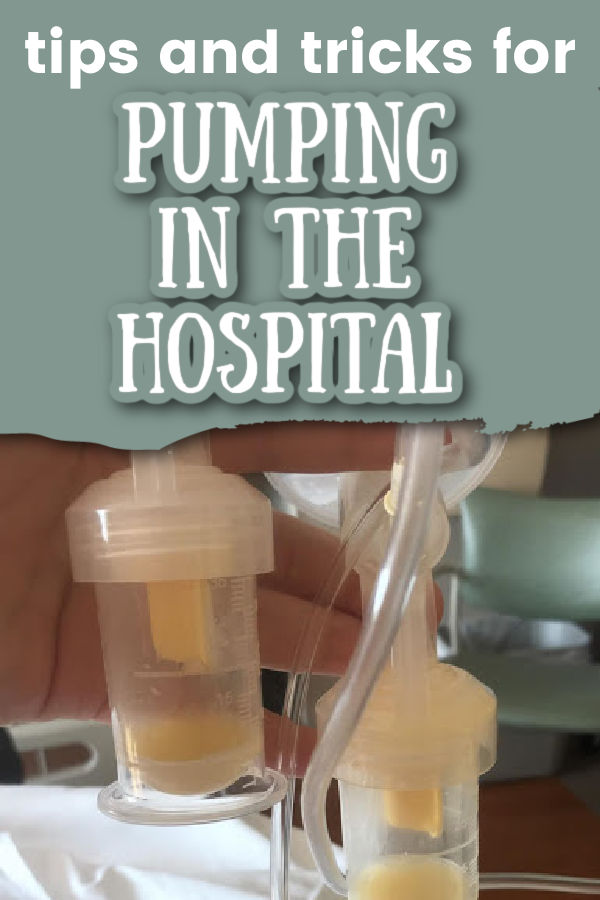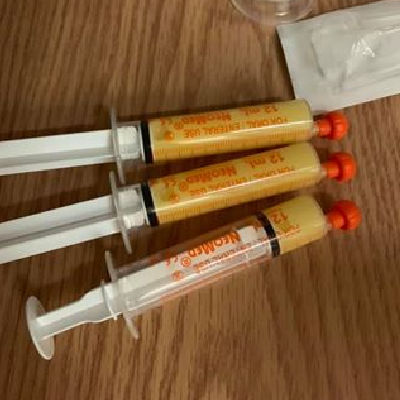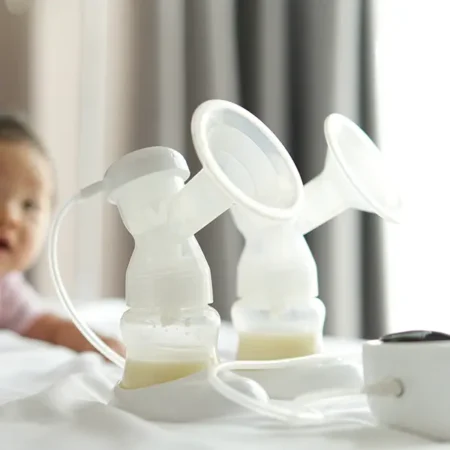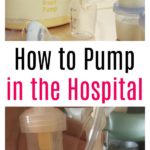There are a lot of reasons you might want to pump breast milk in the hospital – maybe your baby is in the NICU, or maybe you want to exclusively pump from the beginning and not nurse at all.

This post may contain affiliate links, which means if you click a link and take action, I may make a small commission at no additional cost to you. I only recommend products I love! More information here.
Another reason that you might want to pump in the hospital is if your baby is very sleepy after birth. All my babies conked out for about 24 hours a few hours after they were born, so I pumped every few hours during that time to work on establishing supply. (This might not be necessary for you – I recommend asking the lactation consultant at your hospital what they suggest in your situation.)
So how does pumping breast milk in the hospital work? Here are a few common questions.
Do you need to bring a breast pump to the hospital?
In many cases, no, the hospital will provide a hospital grade pump that you can use while you’re there.

However, if you’re for sure planning on pumping in the hospital (say you’re planning to exclusively pump from birth), I would call the hospital and ask so that you can bring your own if necessary. Also, you may want to ask if there is an additional charge for using their pump.
If you’d rather use your own, you can definitely do that! Some insurance companies will allow you to get your pump at no cost before your baby’s birth – more on how to do this here.
Is there anything else you need to bring for pumping breast milk in the hospital?
Some accessories that you might find helpful include:
- A few nursing bras
- A hands-free pumping bra
- Some nursing shirts or other shirts that will allow for easy access
- Breast pads
When should you start pumping?
This depends a bit on your reasons for pumping in the hospital.
If your baby will not be nursing right away – either because she’s in the NICU or because you’ve decided to exclusively pump – I would do it as soon as you get the okay from your provider and you’re ready.
(If you have a difficult birth and aren’t ready right away, it’s okay to take some time. You are important, too!)
If you are nursing your baby, I would only pump when baby is too sleepy to try nursing.
For example, I put baby to my breast and did all the things they tell you to do to wake him up to eat – undressing, etc. – and he more or less just stayed conked out. In this case, pumping to work on establishing supply can be a good idea.
If you’d like, you can also pump after baby nurses to help establish supply. However, be aware that there is a risk of creating an oversupply if you are planning to nurse. In general, I wouldn’t recommend this, but it is an option.
How often should you pump, and for how long?
Again, this depends on why you’re pumping.
Exclusively pumping
If you’re exclusively pumping at the moment (because baby is in the NICU, or because you’ve chosen to), aim for every 2-3 hours during the day and every 4 at night.
Try to hit 8 sessions in a 24 hour period, and pump for 15 minutes at a time.
However, you’ll have just been through a lot, both physically and emotionally. Do the best you can, and be kind to yourself.
Sleepy baby
If you’re pumping because baby is conked out and not nursing at the moment, do every 2-3 hours that she’s not waking up to nurse for 15 minutes each time.
Nursing
If you’re pumping after baby eats for supply-boosting purposes, pump about 30 minutes after a feeding for 5-10 minutes. Be careful not to overdo it.
What do you do with the milk that you pump?
First, be prepared to get little to no milk in the first few days. Colostrum is thick and can be hard to pump, and this is totally normal! I pumped maybe 1-2 ml TOTAL the first few days, and went on to have a great supply.

Pumping at the beginning is still useful for establishing supply, even if your output is small.
If you are lucky enough to pump some milk:
- If you’re in the NICU, the nurses will have a procedure for storing and feeding the milk either via tube or bottle.
- If you’re in your recovery room, I would leave it out at room temperature, and if you’re exclusively pumping, feed it to your baby at the next feeding. (Breast milk can safely be left out for 4 hours.)
- If you are working on nursing and want to feed pumped breast milk, consider using a syringe to avoid issues with nipple confusion.
- If you pump extra milk, in most cases, you can give it to your nurse to store for you.
Finally, if you have end up having a baby in the NICU, be sure to check out this post – 20 NICU moms helped me write it, and it’s full of practical advice on how to manage everything.
Have you pumped breast milk in the hospital? Tell us your experience in the comments.
Want help putting together the perfect pumping schedule for you that saves your sanity AND your milk supply? Check out the Exclusive Pumping Playbook! Includes cheat sheets for setting up systems and routines to make things easier. Use EPUMP30 for 30% off.














